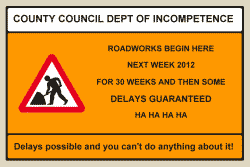On my way to Radcliffe On Trent this morning I got to end of Lings Bar (A52) and traffic was at a standstill heading into Nottingham. I picked up my pupil and we drove off tow ards Bingham, and got into Nottingham via the A46 and A6097 (it only took about 20 minutes going that way). The Nottingham-bound traffic was solid right back to the Bingham roundabout, suggesting that it extended even further back than that – so a jam of at least 6 miles in length.
ards Bingham, and got into Nottingham via the A46 and A6097 (it only took about 20 minutes going that way). The Nottingham-bound traffic was solid right back to the Bingham roundabout, suggesting that it extended even further back than that – so a jam of at least 6 miles in length.
I turned on the radio and enabled traffic announcements and very quickly discovered the problem. Roadworks. Again.
Yes, at Gamston – where there are three lanes – it was down to a single lane because of yet more idiotic roadworks. And this was during the rush hour, of course – there’d be no point doing it any other time because it wouldn’t cause enough of a problem, would it?
I’ve written several times about how the idiotic Nottingham City Council has authorised long-term road and lane closures for the waste of money that is Phase II of the tram system at exactly the same time as allowing National Grid (gas) and whoever Morgan Sindall (electric) are working for to tear up dozens of roads all at the same time. There are temporary lights in literally dozens of places, the majority of which are 3- or 4-way in order to cause the utmost inconvenience to the motorist. To make matters worse, the idle layabouts responsible are missing completion dates repeatedly, and the already pointlessly long predicted durations are over-running by weeks at a time. National Grid in particular appear to have made a huge mistake commencing work in so many places at once, and evidence suggests they are unable to actually complete many of the individual jobs they have begun.
As I’ve also said before, work like this used to be completed in a fraction of the time it does now. They actually plan to close roads for long periods, only engage in actual physical activity for perhaps 10% of the available time, and still miss the completion dates they originally plastered all over the place on their signs.
The particular case referred to in this article was again down to National Grid. I have no idea if it was a repair they were carrying out, or yet more of their highly inefficient gas-main replacement jobs, but to say it caused chaos during today’s rush hour is an understatement
 together I installed 4GB of RAM from Crucial. I’ve had no problems until recently, when I began to get the occasional random shutdown. A quick memory test revealed that my RAM was the problem.
together I installed 4GB of RAM from Crucial. I’ve had no problems until recently, when I began to get the occasional random shutdown. A quick memory test revealed that my RAM was the problem.